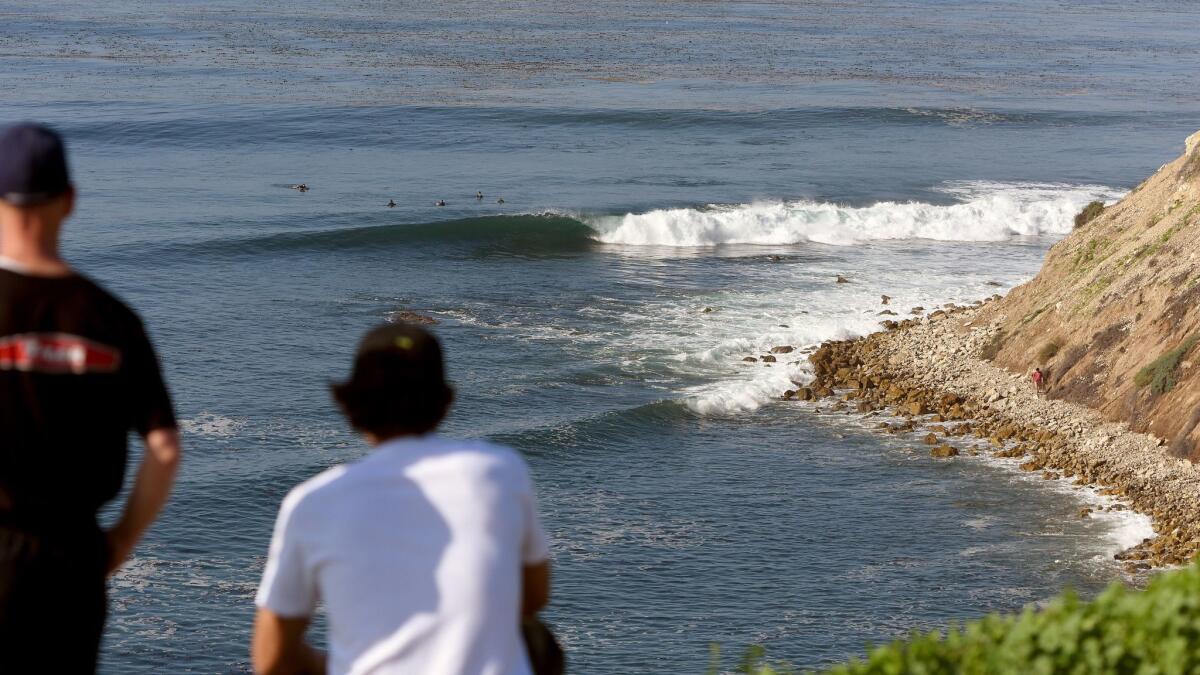Lawsuit against Lunada Bay surfers suffers setback in federal court

A federal judge denied a request this week that would have allowed more people to join a lawsuit that accuses a group of surfers of harassing and assaulting outsiders to keep them away from Lunada Bay, a surf break in Palos Verdes Estates.
U.S. District Judge James Otero on Tuesday rejected a motion for class-action status â a designation that would have let anyone who alleged they were victims of localism by the so-called Bay Boys become part of the litigation.
âThe ruling was a torpedo to the side of this lawsuit,â said Robert Cooper, the attorney for Brant Blakeman, one of 10 defendants in the case. âDespite all of the publicity this case has garnered, we felt all along that it was never a viable lawsuit as a class action.â
The ruling was a torpedo to the side of this lawsuit.
— Robert Cooper, attorney for one of the defendants
Attorney Vic Otten made the request on behalf of his clients, El Segundo Police Officer Cory Spencer, Diana Milena Reed and the Coastal Protection Rangers Inc., a small nonprofit organization.
Their lawsuit claims the Bay Boys amount to a street gang that has for years harassed, assaulted and intimidated beachgoers from outside the area, including the organizer of Lunada Bay surfing events to honor the Rev. Martin Luther King Jr.
The suit also challenges the commitment of Palos Verdes Estates officials to solve the problem and alleges that city efforts have been ineffective against the intense territoriality that has kept people away from the public beach.
A similar case brought by Spencer, Reed and the coastal rangers is pending in Los Angeles County Superior Court.
Defense attorneys assert that the situation at Lunada Bay has been greatly exaggerated, and they question whether the so-called Bay Boys amount to a street gang or even exist. One attorney has described the defendants as friends and members of a surf club.
City officials say they have taken steps to deal with the situation, such as increasing the police presence around Lunada Bay. Those measures, they contend, have been effective as demonstrated by a lack of significant incidents.
In a 23-page decision, Otero ruled that the plaintiffs failed to meet the legal requirements for class-action status. Potential members, for example, did not have enough in common with the experiences of Reed and Spencer, the decision stated.
It is a procedural ruling.... We are dedicated to the case.
— Vic Otten, attorney for surfers who allege they were harassed
Nor did the plaintiffs show there were enough alleged victims to justify the designation, Otero stated. His ruling mentioned that he only had declarations from nine people, two of whom were Reed and Spencer.
Citing the statute of limitations, Otero also decided that any potential class member could not seek damages for incidents that occurred two years or more before March, 29, 2016, the date the lawsuit was filed. The judge noted that seven of the nine people who submitted declarations alleged they were harassed at Lunada Bay more than 10 years ago.
âWe are disappointed by the ruling, but it is a procedural ruling and does not question the underlying facts of the case,â Otten said. âIt does not affect whether we are going to go forward with the three plaintiffs. We are dedicated to the case.â
Follow me on Twitter @LADeadline16
ALSO
âBay Boysâ surfer gang cannot block access to upscale beach, Coastal Commission says
Getting to the beach often comes down to one thing for people: Money
More to Read
Sign up for Essential California
The most important California stories and recommendations in your inbox every morning.
You may occasionally receive promotional content from the Los Angeles Times.











